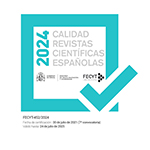Feminización de personajes masculinos en dos montajes contemporáneos de tragedias griegas: el Prometeo de Carme Portaceli y el Creonte de Miguel del Arco
Resumen
En la Antigüedad clásica, donde el teatro era un ámbito masculino, se producía un desdoblamiento de género: un dramaturgo varón escribía un personaje femenino, con un discurso convencionalizado para reflejar, desde una perspectiva masculina, la idea de la feminidad imperante en la sociedad. Dicho personaje era luego interpretado por un actor varón, que abrazaba la contradicción de que dicho personaje femenino proyectara una visión negativa de la sociedad patriarcal. En este artículo se analiza un montaje de estética contemporánea, Prometeo (2010) de Carme Portaceli, y otro de ambientación atemporal, Antígona (2015) de Miguel del Arco. Se estudia, en particular, la transgresión de las convenciones dramáticas sobre género en la tragedia griega, y la transformación dramatúrgica de personajes masculinos en personajes femeninos, para observar qué sucede en la actualidad, y qué se quiere transmitir desde el escenario, cuando hay mujeres interpretando papeles tradicionalmente masculinos. Puede usarse esta perspectiva de género para actualizar la tragedia introduciendo una lente feminista reivindicativa, como en Prometeo, o se puede feminizar el personaje para reformular, como en Antígona, el conflicto de género, subrayando otros.
Descargas
Descarga artículo
Licencia
La revista Cuadernos de Filología Clásica. Estudios griegos e indoeuropeos, para fomentar el intercambio global del conocimiento, facilita el acceso sin restricciones a sus contenidos desde el momento de su publicación en la presente edición electrónica, y por eso es una revista de acceso abierto. Los originales publicados en esta revista son propiedad de la Universidad Complutense de Madrid y es obligatorio citar su procedencia en cualquier reproducción total o parcial. Todos los contenidos se distribuyen bajo una licencia de uso y distribución Creative Commons Reconocimiento 4.0 (CC BY 4.0). Esta circunstancia ha de hacerse constar expresamente de esta forma cuando sea necesario. Puede consultar la versión informativa y el texto legal de la licencia.










